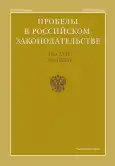Countering extremism in the context of Russia’s migration policy
- Authors: Berova J.M.1, Gelyakhova L.A.1
-
Affiliations:
- Krasnodar University of the Ministry of Internal Affairs of Russia
- Issue: Vol 17, No 6 (2024)
- Pages: 136-141
- Section: Criminal Law Sciences
- URL: https://journal-vniispk.ru/2072-3164/article/view/279852
- DOI: https://doi.org/10.33693/2072-3164-2024-17-6-136-141
- EDN: https://elibrary.ru/HLKNPY
- ID: 279852
Cite item
Abstract
Modern extremism is a complex and multifaceted phenomenon, which exists in various forms in almost all countries. The natural nature of extremism is associated with public reaction to social processes. The state pays close attention to the problems of the development of extremist manifestations. In recent years, the problems of the spread of extremist behavior among migrants have become significantly more relevant. In this regard, many discussions arise regarding the effectiveness of existing mechanisms of anti-extremist activity. The purpose of the presented study is to analyze current issues of combating extremism in the context of Russia's migration policy. Based on the analysis, it is concluded that in modern realities, taking into account migration processes in the context of improving anti-extremist activities is of particular importance, since, on the one hand, migrants are able to increase the risks of developing extremist manifestations on the territory of the Russian Federation, on the other hand, interethnic relations are transformed in one way or another within the framework of migration, which also affects the public perception of such phenomena as extremism. Attention is focused on certain promising areas for improving the existing mechanisms for combating extremism. The special importance of preventive and warning activities is noted, which can minimize both the negative perception of migration processes in Russian society as a whole and specifically influence the spread of extremist ideas and views among migrants.
Full Text
##article.viewOnOriginalSite##About the authors
Juliet M. Berova
Krasnodar University of the Ministry of Internal Affairs of Russia
Author for correspondence.
Email: berova-d@yandex.ru
SPIN-code: 1908-7973
Dr.Sci.(Law), Associate professor, professor of the department of special technical training; North Caucasus Institute for Advanced Studies (branch)
Russian Federation, NalchikLeila A. Gelyakhova
Krasnodar University of the Ministry of Internal Affairs of Russia
Email: Lel4993@mail.ru
SPIN-code: 6865-6515
Cand.Sci.(Law), police major, Head of the Department of Organization of Law Enforcement Activities; North Caucasus Institute for Advanced Studies (branch)
Russian Federation, NalchikReferences
- Kobets P.N. Driving forces contributing to the spread of extremism in the Russian Federation and the main directions for countering them // National security and strategic planning. 2023. No. 3 (43). P. 57-64.
- Makhmutov Z.A. Migrantophobic discourse of ethnic virtual communities in the social network "VKontakte" // Philological sciences. Theory and practice issues. 2024. Vol. 17, No. 3. P. 935-940.
- Novichkov V.E. Some aspects of the criminological characteristics of the crime of foreigners and stateless persons who arrived in the Russian Federation // Legal Bulletin of the Dagestan State University. 2024. Vol. 49, No. 1. P. 131-140.
- On approval of the Strategy for countering extremism in the Russian Federation. URL: https://regulation.gov.ru/Regulation/Npa/Public View?npaID=149268 (date accessed: 01.08.2024).
- Pankina I.Yu. Specifics of ethnic extremism in Russia // Union of criminalists and criminologists. 2023. No. 1. P. 138-141.
- The Chairman of the Investigative Committee of Russia held an operational meeting on the results of the work of territorial investigative bodies in the first half of 2024. URL: https://sledcom.ru/press/events/item/1900153/ (date accessed: 01.08.2024).
- Tryaeva E.O. Improving the extremism prevention system: generalizing the experience of the Russian law enforcement system // Legal science. 2024. No. 1. P. 221-225.
- Federal Law of 25.07.2002 No. 114-FZ "On Counteracting Extremist Activity" (as amended on 15.05.2024) // Collected Legislation of the Russian Federation. 2002. No. 30. Art. 3031.
Supplementary files








